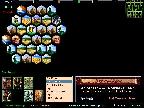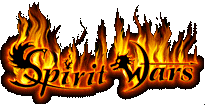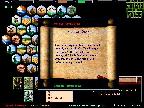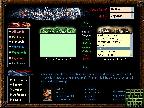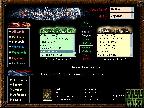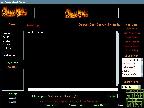
Spirit Wars What do you get when you combine games like Chess, Stratego, or Risk, with Magic: the Gathering? If combined poorly, you get a huge mess on the table in front of you, causing excruciating pain and demanding a massive cleanup effort. However, if done in a more organized manner, you might end up with something much like Spirit Wars, a strategic one-on-one multiplayer game.
Similarly to MtG, in Spirit Wars there are various colors to control, each linked to a certain terrain. There are six in all: yellow (drylands), blue (wetlands), brown (highlands), black (darklands), green (woodlands), and white (flatlands). Also similarly to MtG, summoning spirits of a specific color requires energy of the same color. To summon Woodland Bears, for example, you need four green energy. Energy spirits are your source of this energy in Spirit Wars. For instance, to get that green energy, a Sawmill is most beneficial.
The MtG similarities pretty much end there. SW (Spirit Wars, not Star Wars) takes place on a map, instead of in the abstract world of MtG. Your mission is to protect your castle and destroy the castle of your opponent. The map is randomly chosen, and the castles are placed for you. You could end up about four hexes from your opponent's castle (likely to be a quick game), or you could have much more room to move. Surrounding the castles is your battlefield, composed of the six terrain types corresponding to the six colors. There is a significant bonus given to spirits resting in their homeland (Woodland Bears in a woodland hex). This goes for energy spirits as well, who produce a bonus point of energy if built in their homeland. Due to the random maps, there may be only a couple hexes of a given terrain on a map, so a two-color dungeon is advised.
Aside from energy spirits, there are combat spirits, defender spirits, and spells. Since combat spirits are the most complex, I will get to them last. Spells are pretty straightforward. For instance, pay seven yellow energy to cast Emancipation, and any "slave" spirits that happen to be around will move farther and hit harder; I have grown quite fond of this spell. My Flatlands/Drylands dungeon has over six "slave" spirits in it. They are cheap and worthless when I summon them, but the Emancipation spell (among others) can make them quite formidable warriors.
The next type of spirit is the defender. An example of the defender spirit would be the Woodland Maze. You place this spirit on the map (preferably in a woodland hex) and it can defend any spirit (or your castle) within its blocking range. Say your opponent is attacking your Galley Slaves with his Spartan Militia. You haven't used Emancipation on the poor slaves yet, so they are doomed. Fortunately, you put the Woodland Maze up, so you can block the attack with the defender. Of course, my Flatlands/Drylands dungeon has no Woodlands spirits in it, but it was the first defender to come to mind.
Now it is time for the combat spirits. These are the bread and butter of any dungeon in Spirit Wars. There is a really huge variety of spirits available, ranging from the weak and useless (without help) Galley Slaves, up to the Norse god Thor. Other gods are around as well, but I happen to have Thor, so I thought I would mention him (sadly, he is a Wetlands spirit, and I do not have enough blue energy to maintain him). The various statistics make combat a very strategic process. Most creatures have a move range of just one hex, so anything that can move further than that is very nice, and difficult for the slower opponents to combat. Similarly, most spirits are melee fighters, and can only attack bordering hexes. Thus, archers or any other ranged attack units can be significantly devastating to their opponents. A unit with a move range and attack range of more than one hex (such as my Roman Horse Archers) are among the most troublesome combat spirits out there.
There are more variables for the budding strategist to consider as well. For instance, some spirits are shielded from damage received from a certain color (Apulian Lancers are impervious to Darklands spirits). Some units (mostly Darklands spirits like Lowland Skeletons) can resurrect for a small fee in energy. Some units, such as the Centurion, can exert their leadership over certain friendly units (in this case, any Romans), giving them bonuses to various stats. Other magic using spirits have miscellaneous unpleasant effects to be sent towards enemy spirits, raising maintenance costs, lowering movement ranges, lowering attack power, or even damaging them from across the map (such as Thor and his hammer).
When I first began this review, I was advised to practice a bit in the free version before trying out the member version, and I would advise anyone starting out to do the same. In the free version, everyone has the same spirits to choose from (although many of the better ones are missing), and losing a game has no effect. Therefore, it makes a good practice arena for one considering the member version. In the member version, when an account is first created, it is filled with 200 random spirits. It is up to you to create a playable dungeon out of these spirits, and in some cases that can be a little bit rough. When I first started my game, I had not a single unit with an attack range greater than one, in ANY color (unless you count Thor's hammer spell, but that's not a natural attack, and I could never afford to use it anyway). That, coupled with a few other factors, led me to a 3-7 record after ten matches. Competition is very rough, but after some adjustment I'm a bit more confident.
Speaking of tough competition: should you want to truly challenge yourself, two or three tournaments are held every week. There is a whole array of Tournament Rule Sets that are used during the tourneys that define certain colors, spirits, or even exact dungeons that must be used during the tournament. This can provide for some interesting strategies. The Thieves Den rule set is full of all the spirits that allow you to bring an opponent's spirit under your control. I played (and got immediately eliminated) in a Black and White rule set tournament. I felt a little better when I found out that I lost to the future winner of the tournament.
Now that I have given you an idea of how Spirit Wars works, the time has finally come for me to share my opinion on the game. I would definitely say this game is not for everyone. FPS or Street Fighter-clone fans will probably not find this game very riveting. Thinkers who enjoy stomping people like me in games of Chess or Stratego will probably enjoy SW immensely, as I would think MtG fans would. If you happen to like both Magic: the Gathering and strategic board games, there is no reason you should not give the free version a try. I shall elaborate on my opinions a bit, however.
The gameplay is immensely strategic, no matter how you slice it. Sometimes you win or lose just because you have a horrible draw. Even in a two-color dungeon, I've had white energy coupled with yellow spirits as my only available resources. The map can have an adverse effect as well; in a recent game, my castle was right in the middle, and I had my opponent's castle pretty much stuck between my army and the right edge of the map. That practically guaranteed victory for me (though I almost fouled it anyway). Sometimes your opponent will have a much more powerful dungeon than you will. However, through "migrations" and a player rating system, your dungeon can gain new spirits and you can fight only players around your difficulty. Or, you can be like me, and play against whoever happens to be available at any given time. Even with the odds stacked against you most of the time, through strategic thinking, you can at least put up a decent fight. If not, there is always the "Concede" button.
Something that astounded me regarding this game is the Spirit Wars community. I have played many games online, and the Spirit Wars community is one of the friendliest communities I have come across. I don't recall running into a single jerk the entire time. After getting beat senseless, my opponent did not say, "hA Ha I OwN JoO." Rather, the SW opponents gave me pointers after my first couple matches, or would laugh about interesting instances of luck in the recent match. As far as I have seen, they are the kind of people you want to play games with on a regular basis.
Let's talk graphics and sound. If you are looking for flashy graphics and heart-stopping sound, this genre probably isn't for you. On the battlefield, all combat spirits take one of three forms: a bow and arrow (range attack units), a horse head (for units with a move range greater than one), or a shield (any other combat spirit). You also have a windmill for energy spirits, a tower for defenders, and, of course, a castle. There is no animation at all. There is some pretty fine artwork for the spirits, but that's about it. Of course, this makes the download nice and small, which is a plus. As far as sound goes, there really isn't any. At the start of the activation and movement phases, it makes a little sound to let you know your turn is up -- there are no other sounds. The other phases really could have used alerts, too. While the weak graphics do not necessarily detract from gameplay, a little more sound wouldn't have hurt.
Technically, the game is fairly strong. There is a bug that shows someone as available to play when they are actually already playing a game. Unfortunately, if you challenge a player who isn't really available, you have to close SW in order to make yourself available once again. Aside from that, I have heard talk of an exploitable bug that allows you to use a unit's special ability more than the game restriction of once per round. I have not personally experienced this one, though. Either way, bugs have only been a mild annoyance thus far.
Overall, Spirit Wars is a challenging and enjoyable game. It's definitely not for everybody out there, but strategic-minded individuals owe it to themselves to head on over to at least give the free version a try. A wise man once said, "If it's free, it's for me", after all.
Taken from Gamer's Pulse original review.

Author:
Steve (Bane) Rhoades
June 28, 2000
Review Feedback
Reviewer’s System:
P2-450
128 MB Ram
TNT2
Montego II A3D
56K Modem
4.8x DVD-Rom
10 Gig HDSystem Requirements:
Windows 95/98 (NT may or may not work)
16 MB of RAM (32 MB recommended)
Modem/Internet connection
34 MB hard Drive space
Download size = 13.5 MBPulse Rate:
Concept: 90 - Great ideas reminiscent of other games, yet with an original feel.
Gameplay: 85 - Great tactical/strategic gameplay, although based partly on luck.
Graphics: 70 - Minimal graphics; doesn't detract from gameplay; Spirit art is nice.
Sounds: 50 - A bit skimpy on the sound effects.
Technical: 82 - The availability bug is annoying, but not too bad.
Overall: 75 - Stratego, Risk, Chess or Magic: the Gathering fans should love it.
Genre:
Strategy
Release Date:
Available
Publisher:
Spirit WarsDeveloper:
Spirit Wars
